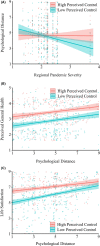Perceived Control Buffers the Effects of the COVID-19 Pandemic on General Health and Life Satisfaction: The Mediating Role of Psychological Distance
- PMID: 32955170
- PMCID: PMC7537495
- DOI: 10.1111/aphw.12232
Perceived Control Buffers the Effects of the COVID-19 Pandemic on General Health and Life Satisfaction: The Mediating Role of Psychological Distance
Abstract
Background: Ways to maintain good health during a pandemic are very important for the general population; however, little is known about the impact of the coronavirus disease 2019 (COVID-19) on individuals' life satisfaction and perceived general health. This study aimed to examine the effects of COVID-19 on life satisfaction and perceived general health and reveal the buffering effect of perceived control on coping with COVID-19.
Methods: We collected 1,847 participants' data from 31 pandemic-affected provinces in China and obtained regional epidemic data of the same provinces. We employed a moderated mediation model with both individuals' self-report data and regional epidemic data to verify the hypotheses.
Results: Psychological distance mediated the relationships of regional pandemic severity with perceived general health and life satisfaction. Perceived control moderated the detrimental effects of regional pandemic severity through the moderating effects of regional pandemic severity on psychological distance, as well as the moderating effects of psychological distance on life satisfaction.
Conclusions: Our findings indicate that perceived control may act as a protective factor buffering the psychological impact of the pandemic on general health and life satisfaction. Psychological distance can serve as a mediator that explains how the COVID-19 pandemic impacts perceived general health and life satisfaction.
Keywords: COVID-19; health; life satisfaction; perceived control; psychological distance.
© 2020 International Association of Applied Psychology.
Figures


Similar articles
-
Associations Between the Perceived Severity of the COVID-19 Pandemic, Cyberchondria, Depression, Anxiety, Stress, and Lockdown Experience: Cross-sectional Survey Study.JMIR Public Health Surveill. 2021 Sep 16;7(9):e31052. doi: 10.2196/31052. JMIR Public Health Surveill. 2021. PMID: 34478402 Free PMC article.
-
The effects of perceived psychological, educational, and financial impact of COVID-19 pandemic on Greek university students' satisfaction with life through Mental Health.J Affect Disord. 2022 Mar 1;300:289-295. doi: 10.1016/j.jad.2021.12.114. Epub 2022 Jan 1. J Affect Disord. 2022. PMID: 34979179 Free PMC article.
-
Perceived stress and life satisfaction during COVID-19 pandemic: the mediating role of social adaptation and the moderating role of emotional resilience.Psychol Health Med. 2023 Jan;28(1):124-130. doi: 10.1080/13548506.2022.2038385. Epub 2022 Feb 9. Psychol Health Med. 2023. PMID: 35139700
-
Death anxiety and satisfaction with life among the adults in the social isolation process of Covid-19 pandemic: the mediating role of perceived stress.J Ment Health. 2023 Dec;32(6):1086-1095. doi: 10.1080/09638237.2022.2069689. Epub 2022 Jun 30. J Ment Health. 2023. PMID: 35770825
-
Country/Region Level Pandemic Severity Moderates the Relationships among Risk Experience, Perceived Life Satisfaction, and Psychological Distress in COVID-19.Int J Environ Res Public Health. 2022 Dec 9;19(24):16541. doi: 10.3390/ijerph192416541. Int J Environ Res Public Health. 2022. PMID: 36554423 Free PMC article.
Cited by
-
Emotion differentiation and negative emotional states: the mediating role of perceived academic control and the moderated effect of intrinsic motivation.Curr Psychol. 2022 Sep 12:1-17. doi: 10.1007/s12144-022-03697-5. Online ahead of print. Curr Psychol. 2022. PMID: 36118142 Free PMC article.
-
How Does COVID-19 Risk Perception Affect Sense of Control? The Roles of Death Anxiety and Confucian Coping.Int J Environ Res Public Health. 2023 Jan 28;20(3):2299. doi: 10.3390/ijerph20032299. Int J Environ Res Public Health. 2023. PMID: 36767666 Free PMC article.
-
The Relationship Between State Loneliness and Depression Among Youths During COVID-19 Lockdown: Coping Style as Mediator.Front Psychol. 2021 Sep 14;12:701514. doi: 10.3389/fpsyg.2021.701514. eCollection 2021. Front Psychol. 2021. PMID: 34594266 Free PMC article.
-
Perceived control moderates the internalized stigma model of seeking mental health services in distressed older adults.J Couns Psychol. 2024 Oct;71(5):473-486. doi: 10.1037/cou0000733. Epub 2024 Apr 11. J Couns Psychol. 2024. PMID: 38602789
-
A Multisample Path Analysis Including a Novel Psychological Indicator, Attitude Toward Life, After the First Wave of COVID-19.SAGE Open Nurs. 2024 Jan 8;10:23779608231215580. doi: 10.1177/23779608231215580. eCollection 2024 Jan-Dec. SAGE Open Nurs. 2024. PMID: 38204585 Free PMC article.
References
-
- Alonso‐Ferres, M. , Imami, L. , & Slatcher, R.B. (2020). Untangling the effects of partner responsiveness on health and well‐being: The role of perceived control. Journal of Social and Personal Relationships, 37(4), 1150–1171.
-
- Bults, M. , Beaujean, D.J. , de Zwart, O. , Kok, G. , van Empelen, P. , van Steenbergen, J.E. , … Voeten, H.A. (2011). Perceived risk, anxiety, and behavioural responses of the general public during the early phase of the Influenza A (H1N1) pandemic in the Netherlands: Results of three consecutive online surveys. BMC Public Health, 11(1), 2. - PMC - PubMed
-
- Chandran, S. , & Menon, G. (2004). When a day means more than a year: Effects of temporal framing on judgments of health risk. Journal of Consumer Research, 31(2), 375–389.
-
- Drewelies, J. , Schade, H. , Hülür, G. , Hoppmann, C.A. , Ram, N. , & Gerstorf, D. (2020). The more we are in control, the merrier? Partner perceived control and negative affect in the daily lives of older couples. Journals of Gerontology: Series B, 75(2), 338–348. - PubMed
Publication types
MeSH terms
Grants and funding
LinkOut - more resources
Full Text Sources
Medical

